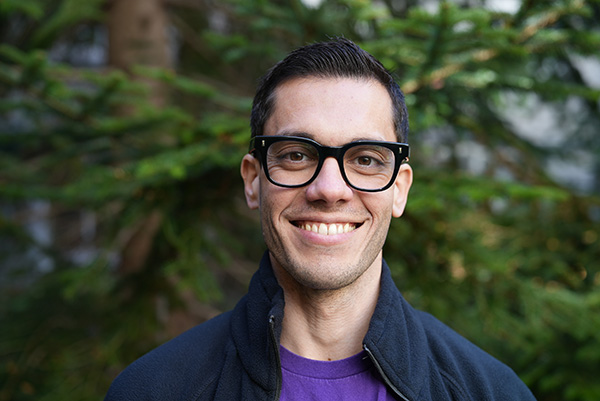Admissions
Equity, Diversity, Inclusion and Decolonization
The School of Graduate and Postdoctoral Studies is committed to equity, diversity, inclusion and decolonization in all aspects of graduate and postdoctoral studies. For more information regarding these commitments please visit grad.uwo.ca/edi-d.
Biology
Doctor of Philosophy (PhD)Meet Matheus Sanita Lima, PhD candidate in Biology

Supervisor: Dr. David Smith
Where did you complete your undergraduate degree?
University of Sao Paulo (USP), Brazil
Describe your research.
I study how the genomes of mitochondria and chloroplast evolve over time. My work is all in silico (i.e., on the computer only), and I focus on the regions of the genome that lie between genes. These regions are often called “the dark matter” of the genomes, as we don’t know yet how functional (or not) they are.
Have you taken any professional courses through Own Your Future?
Yes, I have taken several of the OYF courses/workshops. The Own Your Future program is a great way to establish connections outside of our own academic bubble. We often get too focused on our lab/office activities, that we forget that there is a world out there. People don’t know you, if they don’t hear about you. The same applies on the other direction – you can’t really know what other great things are being done, if you don’t go out there and connect. The OYF series has brought my attention to several aspects of my professional development that I did not think of previously and this is helping me become a well-rounded professional.
Do you serve on any committees?
I serve on (too) many committees. Some of them are the SOGS Board of Directors, the SUPR-G (Subcommittee on Program Review – Graduate), SCUP (Senate Committee on University Planning), and the SOBGS (Society of Biology Graduate Students) Executive Team.
What’s your favourite book?
Every Living Thing: The Great and Deadly Race to Know All Life by Jason Roberts. This is a MUST read.
What one thing would you like people to know about you?
I have OCD (Obsessive Compulsive Disorder), and I love talking about it.
What idea, suggestion, or comment would you like to share with the Western graduate community?
Remind yourself that you are part of the upcoming workforce. How can you prepare yourself to the challenges ahead of us, regardless of their scope. Try to be thoughtful and insightful. In our busy lives, we rarely take the moment to pause, assess, and commit with purpose.
Program Websites
Program Contact
Sarah Abbas (sabbasep@uwo.ca)Graduate Program Assistant
Department of Biology
Western UniversityBiological and Geological Sciences Building Rm 2025C
London, Ontario N6A 5B7
t. 519-661-2111 ext. 81207
f. 519-661-3935
Biology at Western offers research-intensive, thesis-based graduate training at the Masters' and the Doctoral level. We offer world class facilities, a stimulating and collegial training environment, and high profile research programs overseen by internationally recognized faculty. We study life from a variety of perspectives including ecology and evolution, molecular and cellular biology, and physiology and biochemistry.

The Own Your Future doctoral professional development program will help you become a career-ready graduate with the skills necessary to excel in your studies and achieve your future goals. By participating in the program, you will assess your own strengths and opportunities for growth, choose what skills you want to enhance during your time at Western, and learn how to articulate the skills you gained in your degree to optimize your future career opportunities. To learn more, visit www.uwo.ca/ownyourfuture.
Program Length
- 12 Terms
Program Design
- Full-time study
- Thesis-based
Funding Information
Applicants are encouraged to apply for the following scholarships (if eligible):
Tuition and Fees
Tuition and fee schedules (per term) are posted on the Office of the Registrar's website at http://www.registrar.uwo.ca/student_finances/fees_refunds/fee_schedules.html
Graduate Student Affordability Calculator
Use this helpful tool to estimate how much money you will need to pay for your tuition, fees, housing, food, and other necessities for a 12-month (three term) academic year.
Admission Requirements
- Successful completion of a thesis-based Master’s Degree in Biology or related discipline.
- Achieved at least a 78% overall average in the master's degree.
English Language Proficiency
Applicants whose first language is not English must furnish evidence of their proficiency in the use of the English language:
- The Test of English as a Foreign Language (TOEFL). Minimum acceptable score is 600 for the paper and pencil version, 250 for the computer version, or 100 for the internet version with no individual score below 23 of the four skill categories. [Western's TOEFL ID is 0984].
- The International English Language Testing Service (IELTS Academic). Minimum acceptable score is 6.5 out of 9 overall and in each of the four categories.
Application Deadline
Domestic Applicants:
- November 1 - Winter Term
- March 1 - Spring Term
- July 1 - Fall Term
International Applicants:
- June 15 - Winter Term
- November 15 - Summer Term
- March 15 - Fall Term
Applications are processed on a rolling basis. Students are typically notified within one month of receipt of a completed application. Most students apply for and are admitted for the Fall term, but January and May admissions are also considered.
Fields of Research
- Cell and Molecular Biology
- Ecology and Evolution
- Physiology and Biochemistry






